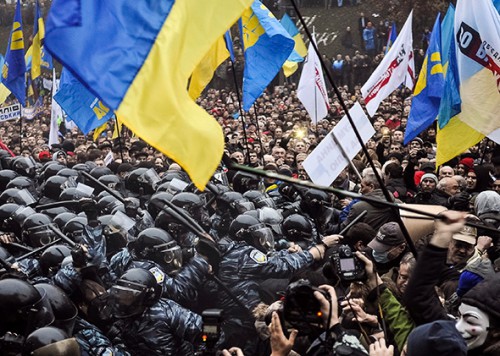
|
Ex: http://www.strategic-culture.org
|
|
At the Munich Security Conference
the Ukrainian opposition and the U.S. essentially agreed on a plan to
force Viktor Yanukovich to capitulate. Arseniy Yatsenyuk told of this
plan of action, which was worked out with the direct participation of
Western representatives, after a meeting with U.S. Secretary of State
John Kerry and EU officials. While the «Euromaidan» is shoring up its
tents, showing that it is there for the long haul, the State Department
has appointed a time by which the regime change operation in Ukraine is
to be finished: March 24. That is how the message which appeared on the
official site of the U.S. State Department on January 24 could be
interpreted:

«Ukraine Travel Alert. The U.S. Department of State alerts U.S.
citizens of the potential risks of travel to Ukraine due to the ongoing
political unrest and violent clashes between police and protesters.
Protest-related violence, particularly in Kyiv, has escalated sharply
since January 19, resulting in several deaths and hundreds of injuries.
Protesters have occupied Kyiv’s Independence Square and several
government buildings in Kyiv and other cities throughout Ukraine.
Groups of young men, popularly called “titushky,” have attacked
journalists and protesters and committed other random acts of violence
in Kyiv and other cities. U.S. citizens are advised to avoid all
protests, demonstrations, and large gatherings. U.S. citizens whose
residences or hotels are located in the vicinity of the protests are
cautioned to leave those areas or prepare to remain indoors, possibly
for several days, should clashes occur. This travel alert expires on
March 24, 2014».
The start of implementation of the regime change plan most likely will
coincide with February 7. Two significant events are to occur on this
date: the start of the Olympic Games in Sochi and the deadline on
suspension of the cap on the U.S. state debt agreed upon by the President and the Congress.
Today, as six months ago, when the situation in Syria abruptly
deteriorated and everyone was expecting the beginning of a military
campaign against that country, the masters of the dollar from the Federal Reserve
and the U.S. government once again face the same self-destructive
dilemma: to default and declare America bankrupt or to raise the debt
ceiling once again and further toughen austerity measures. On the
international arena this dilemma is directly linked with the need to
reevaluate the status and role of American currency.
The masters of the dollar are unable to resolve the problem which is
making America's life difficult. In recent years they have merely been
postponing a solution, making do with initiating cataclysms to distract
attention from the dramatic situation with America's currency. Now a new
flare-up in the problem has been postponed until February after
something similar occurred last autumn amid the dramatic happenings
which fastened the entire world's attention to Syria (the drama was
instigated by America's allies among the Islamist terrorists who
falsified a «chemical attack»
in August 2013). A similar refocusing of the world media's attention is
occurring today, but this time the role of the main «distraction» is
being played by the disturbances and pogroms on the streets of Kiev and other Ukrainian cities.

Compare these two illustrations; they are identical. In the
illustration framed in red are instructions in Arabic developed by
American specialists during the first stage of the «popular protest» in
Syria (2011). Framed in yellow are instructions in Ukrainian for Kiev's
Maidan activists.
The problem of a U.S. default first became a major issue in 2008, soon
after Moscow's statement that Russia is setting a course toward economic
integration of Eurasian countries. Then the Americans were able to
distract the world's attention by shifting it to the slaughter in South
Ossetia started by their Georgian puppets on the day of the opening of
the Olympics in Beijing and to what the world media called «the
beginning of the global economic crisis».
The default of the «global superpower» and the collapse of the currency
system and the dollar will most likely not take place immediately after
February 7 either, despite the most acute financial and economic crisis
since the time of the Great Depression and the astronomical proportions
of the aggregate debt of the United States. The masters of the American
currency have initiated a whole series of crises which could give the
dollar its next reprieve.
The most «promising» crisis has been created around Ukraine, to whose
shores the U.S. is already prepared to send its warships under the
pretext of the Sochi Olympics. Thanks to the sensation surrounding the
disturbances in Ukraine, key facts which testify to the acuteness of the
problems facing Americans remain practically unnoticed in the world
media. Such as information about the size of the drop in the real
disposable income (RDI) of Americans since 1974 (the change is reflected
in the following graph):

These events affect Europe as well. Even pro-American Polish
politicians, such as former president of Poland A. Kwasniewski, who
represents the European Parliament in Ukraine with regard to the
Tymoshenko case, speak of this with alarm. «The situation in Ukraine,»
says Kwasniewski, «could get completely out of the control of the
authorities and the opposition and have extremely tragic consequences
not only for Ukrainians, but for the European Union as well... The fact
that innocent people are being killed in Ukraine could cause a wave of
migration and economic problems... We truly are in danger of a great
tragedy. I think that European diplomats, diplomats from neighboring
countries and Poland should be very sensitive to these matters. We could
end up in a spiral of events which we will no longer be able to
stop..».
Besides the crisis in Ukraine, which is distracting the international
public from the upcoming battle for the future of the dollar on Capitol
Hill, another three «backup» crises are being prepared in Thailand,
Egypt and Syria. On the eve of the Olympics, Damascus is supposed to
report on the liquidation of its chemical weapons. The plan adopted in
November provides for the weapons to be completely removed from the
country by February 5. However, Syria is clearly lagging behind
schedule. But both Damascus's fulfillment (disarming before a potential
aggressor) and non-fulfillment of its obligations with regard to
chemical weapons give Washington a pretext to step up actions against
Syria, Russia's last Middle Eastern frontier. It's not for nothing that
at the Munich Security Conference the U.S. attempted once again to talk
with Syria in the language of ultimatums, and the radical Islamists from
the Caucasus Emirate, who are fighting on the side of the Syrian
rebels, are already prepared to act in Ukraine after the recent call for
their confederates to «go on jihad» both in Syria and in the Northern
Caucasus.
|
